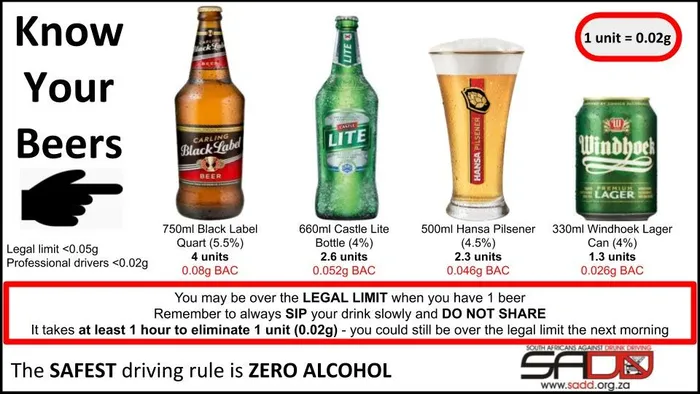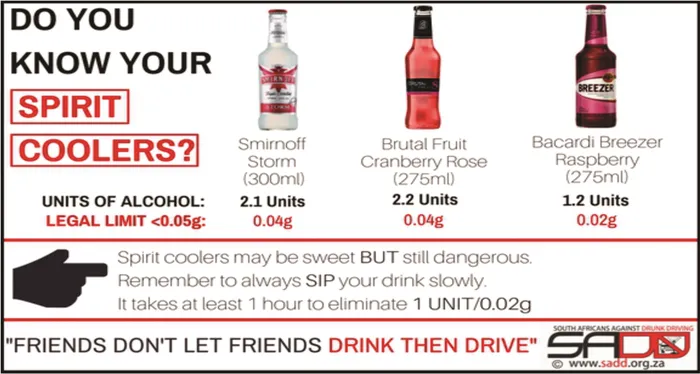How many beers is too many? Understanding SA's drink-driving limits

How many beers you can drink.
Image: South Africans Against Drunk Driving
Rhys Evans
South Africa's drink-driving limit according to the Road Traffic Act amounts to a legal Blood Alcohol Concentration (BAC) of 0.05 grams per 100 millilitres of blood for general drivers. This means that if you're a regular driver, your blood can only have up to 0.05 grams of alcohol per 100ml before you're over the legal limit.
For professional drivers, like truck or taxi drivers, the limit is even lower at 0.02 grams. The general drink-driving limit is roughly equivalent to one or two 300ml beers (at 5% alcohol) or one to two glasses of wine at 120ml, depending on individual factors. However, this seemingly simple calculation creates a false sense of security – one that can have deadly consequences on South Africa's roads.
Alcohol metabolism and its hidden dangers
Alcohol is metabolised slowly, at approximately 0.015 BAC per hour. Even a seemingly modest amount – two beers, for instance – can linger for two to three hours. Many drivers fail to realise how quickly they can exceed the limit or, more critically, how alcohol impairs judgement and slows reaction time long before reaching it.
Alcohol contributes to a staggering 65% of fatal road accidents in South Africa. A single gram of alcohol – about half a beer – compromises driving ability, impacting coordination, vision, and cognitive function. This is precisely why professional drivers face stricter regulations; their responsibility is greater, and the risks of impairment can be catastrophic.

How many spirit coolers you can drink.
Image: South Africans Against Drunk Driving
The knowledge gap: How many know the limits?
How many South Africans actually know our legal drink-driving limits? Alarmingly few. This widespread lack of awareness is a major contributor to alcohol-related road deaths. If drivers don't know the limits, how can they adhere to them? South Africa's drink-driving limits are scientifically grounded and relatively stringent. For instance, our old limit of 0.035 mg/l - still in place in the UK – was considered too lenient and revised. But at home, these limits are almost meaningless due to woefully inadequate enforcement.
The alcohol equation isn’t one-size-fits-all
Numerous factors, including body weight, gender, metabolism, and genetics, influence alcohol processing. Yet, this vital information is widely misunderstood. South Africa’s current awareness campaigns fail to resonate - they rely on uninspired messaging that lacks impact.
Generic "drink responsibly" messages are not enough. Public awareness campaigns must go beyond clichés and deliver concrete, scientifically accurate information about alcohol's effects and metabolism. A more effective approach would involve targeted interventions - educational initiatives in schools, workplaces, and community groups. Integrating alcohol awareness into driver education and learner's licence applications could further reinforce these messages.
What the public should know about Blood Alcohol Concentration (BAC) and how it relates to the drink-driving limit:
- Amount of alcohol consumed: The more alcohol consumed, the higher the BAC.
- Rate of absorption: Slower absorption leads to lower peak BAC.
- Time: Consuming alcohol over a longer period results in a lower final BAC.
- Rate of consumption: Consuming alcohol at a faster rate rapidly increases alcohol absorption.
- Stomach contents: Food, especially fatty substances, slows alcohol absorption.
- Body weight: Larger individuals generally have lower BACs due to greater water content.
- Body composition: Individuals with higher body fat percentages will have higher BACs than muscular individuals of the same weight, as alcohol is less soluble in fat.
- Gender: Women generally have a higher ratio of body fat to water than men, resulting in higher BACs for the same amount of alcohol.
Regardless of your tolerance or understanding of alcohol limits, if you plan to have even one or two drinks, it’s best not to drive. If you’re having more than two, you definitely shouldn’t be behind the wheel.
Unaware and unpunished: South Africa’s drink-driving crisis
With many South Africans unaware of the legal drink-driving limits, this knowledge gap is further exacerbated by weak enforcement. While penalties for exceeding these limits - fines, imprisonment, licence suspension, and a criminal record - may seem strict, they are rarely enforced with consistency. The long-promised demerit system remains unimplemented, further undermining the law's effectiveness.
The emphasis must shift from simply lowering limits to actively enforcing them. This requires more frequent roadside breathalyser checkpoints, visible policing, and a more effective system for prosecuting offenders. Without effective enforcement, the limits are easily ignored. While technology such as in-car alcohol detection systems could play a valuable role, these solutions are costly and often viewed as intrusive. A more targeted approach might involve mandatory in-car breathalysers for repeat offenders.
Shaping responsible choices starts at an individual level
While drink-driving limits, strict policing, and firm enforcement are essential, they alone won’t solve the problem. True change requires a cultural shift. South Africans must foster a society where drunk driving is socially unacceptable – where friends intervene, families hold each other accountable, and communities actively discourage risky behaviour.
South Africa's drink-driving crisis demands decisive action on multiple fronts. Our drink-driving limits are scientifically sound, but without consistent enforcement, they fail as a deterrent. Public awareness campaigns must move beyond generic slogans, providing real, actionable knowledge about alcohol's effects. A multi-pronged strategy – prioritising law enforcement, strengthening education, and instilling personal responsibility – is the only way to create lasting change.
Rhys Evans is Managing Director at ALCO-Safe

Rhys Evans, Managing Director at ALCO-Safe.
Image: Supplied